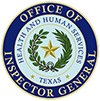Medicaid was overbilled for more than $45,000 for telehealth visits
OIG auditors found a behavioral health services provider double-billed the state for telemedicine visits and improperly submitted claims for facility fees that were not provided. The improper payments totaled $45,412 for errors uncovered during the audited period, from June 2021 until December 2021. During this time, the provider, Baylor Scott & White Health (BSW), submitted 1,887 claims to Texas Medicaid and was paid $144,800 for telemedicine services related to behavioral health.
During the audit, it was found that BSW had a systematic billing issue where the provider improperly submitted both professional and institutional claims for 470 telehealth visits when only the professional claims were allowed. The error resulted in double-billing the state for $30,239 in psychiatry, psychotherapy, evaluation and management services.
Auditors also discovered 183 instances of improper billing for facility fees involving telehealth visits. These fees are paid to a provider when the client receives the service in a location owned by the provider. However, BSW charged Medicaid $13,628 in facility fees when medical records indicated the client was not physically at their location.
In addition to the errors with facilities and institutional claims, BSW used incorrect Current Procedural Terminology (CPT) codes for 30 of 95 reviewed claims for service, resulting in $1,544 in overbilling. BSW also failed to show evidence that it had provided its privacy policy to three out of 88 clients before beginning treatment.
To resolve the errors discovered during the audit, the OIG found BSW should repay $45,412 to the state and verify that claims and billing procedures follow Texas Medicaid policies. Specifically, the provider should:
- Implement processes to align its billing processes with Texas Medicaid rules and limit billing to allowable services that it provided to Texas Medicaid patients.
- Implement processes to ensure that claims for services billed as time-based CPT codes are based on the actual length of services provided, and that medical records include documentation to support the CPT codes billed, and identify the services provided.
- Provide its patients with written or electronic notification of its privacy practices prior to evaluation or treatment via telemedicine services and document the notification was provided.

